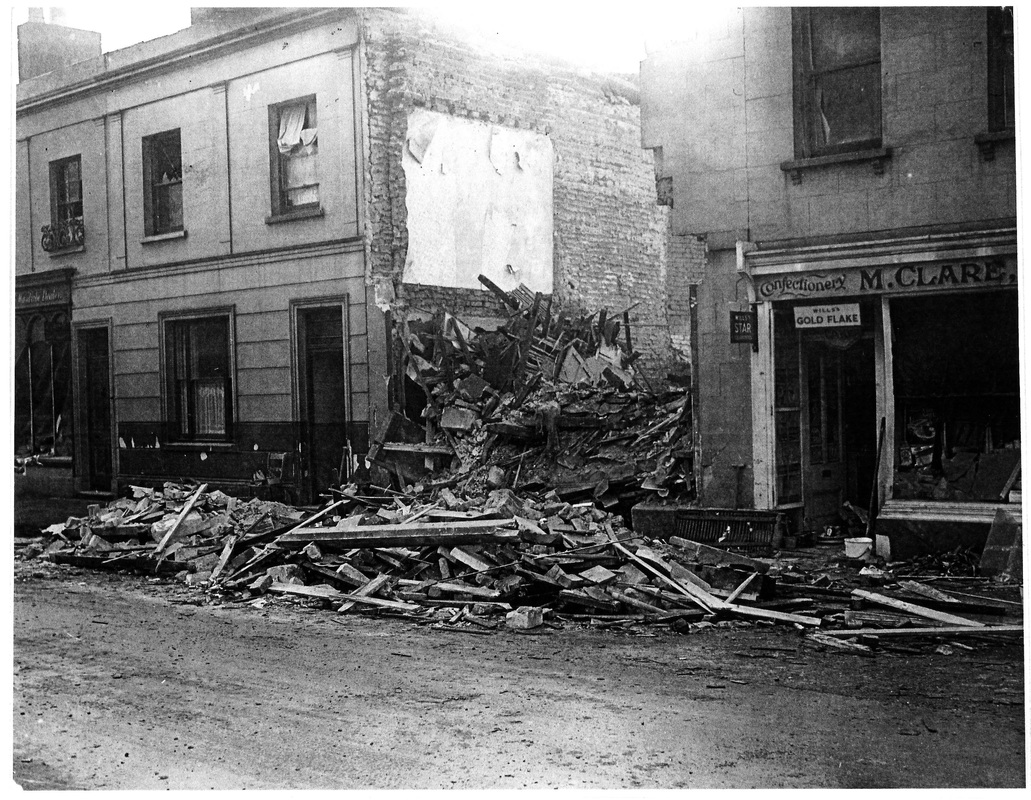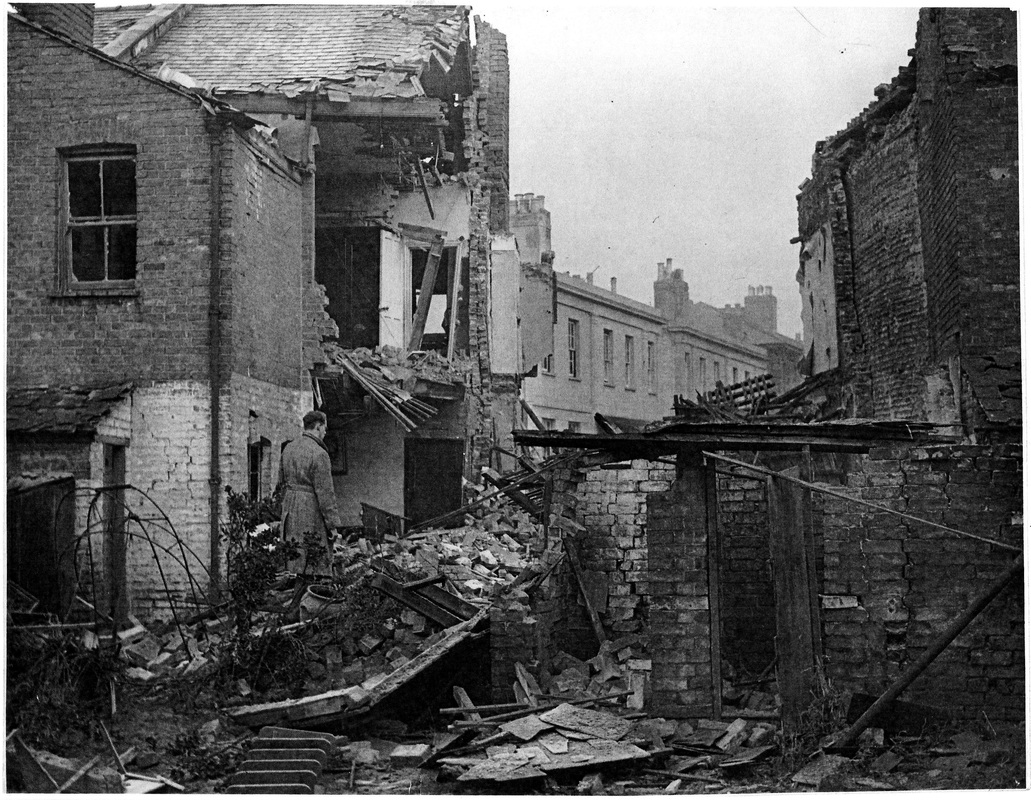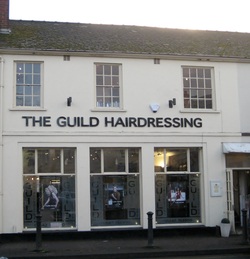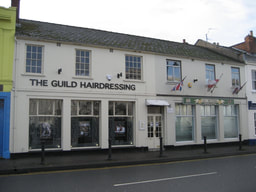The Suffolks │46 previous / next │main map / suffolks map
18 Suffolk Road (formerly 9 Northwick Terrace)In 1841 the occupants of this house were John Powell, a stonemason and builder, his wife Ann and their children Mary, Ann, Hannah, George, Sophia and Caroline. All of the daughters came to be employed as either dressmakers or straw bonnet makers but sadly Mary died here in 1845, aged just 29.
The daughter Ann married a local man named Dennis Potter, a silk manufacturer, in 1847 and they lived here with her parents. Dennis Potter was born in Montpellier Terrace in about 1818, making him one of the earliest inhabitants of that street. He was also one of the first members of the Cambray Baptist church and was a prominent teetotaller. Mrs Ann Powell died in 1853 but her husband John, who was the master and treasurer of Cambray chapel, continued to live here until his death in 1880 at the great age of 87. In the early 1870s Dennis Potter founded a china retail business at Staffordshire House (now 48 Suffolk Road) and this was later inherited by his son John Henry Powell Potter. By 1881 Dennis Potter had become the principal occupant of 9 Northwick Terrace but also shared the property that year with his wife Ann and a lodger called Martha Axford, who was a dressmaker. Eight years later there was another tenant, an artist who advertised teaching painting on fans and tapestry in watercolour, and was known simply as "R.T.". Dennis Potter joined the Bethesda chapel late in life and died here at Northwick Terrace in 1898. 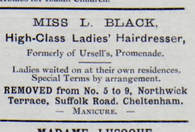 Cheltenham Looker On, 1912 Cheltenham Looker On, 1912
In 1907, and again in 1911, the house came up for sale or rent, including 4 bedrooms, 2 reception rooms and stabling. It was listed as being "1 minute from the tram", which then ran down Bath Road into the High Street. By 1912 a new occupant had been found, in the form of Miss L. Black, a hairdresser and manicurist.
Just over a decade later the house accommodated Mr & Mrs Charles Thomas Deane. Mr Deane described himself as a registrar of marriages. The house was bomb-damaged in WWII and later rebuilt. In 1952, and until at least 1975, both numbers 18 and 20 Suffolk Road belonged to Leckhampton Estates Ltd, Builders and Contractors, who in the later years shared number 18 with the Gloucester Association of Boys’ Clubs.
20 Suffolk Road (formerly 10 Northwick Terrace)In 1851 this house was taken by Mr Pio Cianchettini, who had formerly lived at 11 Great Norwood Street. He was born in London in 1799, of a musical family, and when he was only 5 years old he performed a sonata of his own composition at the Opera House in London, being hailed as the "English Mozart". Pio later became a celebrated music performer and teacher, playing the piano and conducting fashionable, popular concerts in London and at venues such as the Cheltenham Assembly Rooms and at the Montpellier Rotunda.
In Cheltenham, Pio and his wife Emma Athanasia Cianchettini had moved from Great Norwood Street to Gratton Terrace in 1847, where she sadly died two years later aged just 28. From the spring of 1851, at 10 Northwick Terrace, Pio gave instruction in singing, piano lessons, and in musical composition. He was, however, in poor health and sadly he died just a few months later, in July 1851, leaving a destitute 8 year old orphan son called Francis. Pio's friends opened an appeal for the boy, with the aim of collecting sufficient funds to ensure he had a good education. We know that at the age of 28 Francis was married and staying as a lodger in Lancashire, where he was a timber trade clerk, but his trail ends there. At Northwick Terrace, in 1859, another professor of music and sometime organist at St James' church, Mr W.H. Snelling, was teaching here. Then, from before 1871, this property was home to Herbert Early, a tailor, and his wife Felicia Matilda. Mrs Early died here in 1881 but Herbert continued at this address until after 1897. By 1907 the occupant was Charles Robert Iles, a lithographer. He was succeeded after his death at the age of 81, in 1924, by his son William Young Iles, also a lithographer, and William's wife Annie. Tragically, the house was bombed, and totally destroyed, by the Luftwaffe on 11th December 1940 and Mrs Annie Elizabeth Iles, aged 55, was killed. This was one of 6 raids on the town and it was the heaviest, resulting in 23 deaths and 600 people losing their homes. More than 100 high explosive bombs, and many incendiaries, were dropped that dark evening from 7.30pm until after midnight, by wave after wave of raiders, in a line from Pilley to the Tewkesbury Road. It was thought that the raid was intended to be upon Birmingham and that Cheltenham was hit in error. Amongst the devastation, Pilley Bridge and one of the gasometers in Gloucester Road were destroyed. The newspapers were unable to report on air raids during the war but following the declaration of Victory in Europe, the Gloucestershire Echo, in May 1945, described the appalling events of that night as follows. "Viewed from the centre of town the attack was an unforgettable and terrifying spectacle, with anti-aircraft guns blazing away, shrapnel exploding in the star-lit sky, and bombs crashing down with a violence that shook the whole town." The damaged properties either side of 20 Suffolk Road were demolished and rebuilt after the war, in a very different architectural style. The new premises were occupied by Leckhampton Estates Ltd, Builders and Contractors. In 1975 W.A.Woof Ltd, presumably having relocated from number 8 Suffolk Road, was listed here as a Sports Outfitters.
Since 2000 this has been the home of The Guild Hairdressing salon, under the ownership of Mike Lunnon. Researcher: Stuart Manton (August 2017)
|
|
If you have any further information or photographs of this property please let us know via the contacts page.
